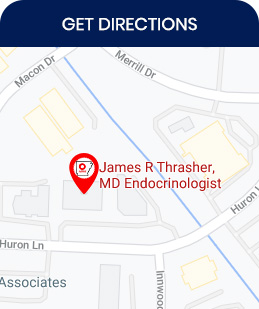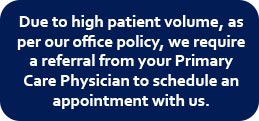How to Identify Hyperglycemia Symptoms Early
Identifying hyperglycemia symptoms early is crucial to preventing long-term health issues. Dr. James Thrasher of the Arkansas Diabetes and Endocrinology Center advises watching for signs like increased thirst, frequent urination, fatigue, and blurred vision. These symptoms may seem mild at first but can quickly escalate if not addressed. For more information, Contact us for an appointment online. We are conveniently located at 11400 Huron Lane, Little Rock, AR 72211.


Table of Contents:
What are the most common early signs of hyperglycemia?
Can hyperglycemia develop suddenly, or is it a gradual process?
How often should I monitor my blood sugar to catch hyperglycemia symptoms early?
Are there lifestyle changes that can help reduce the risk of hyperglycemia symptoms?
How do the providers at Arkansas Diabetes and Endocrinology Center help patients identify and manage hyperglycemia symptoms effectively?
At Arkansas Diabetes and Endocrinology Center, we understand that hyperglycemia—high blood sugar—can develop gradually, often without noticeable symptoms in the early stages. However, recognizing the warning signs is crucial for timely intervention and effective diabetes management. Some of the most common early indicators include increased thirst, frequent urination (especially at night), and unexplained fatigue. You may also experience blurred vision as elevated blood sugar levels affect the eye’s lens, as well as headaches or difficulty concentrating.
In our experience, some patients also report feeling hungrier than usual or notice slow-healing wounds and recurrent infections. These symptoms occur because high blood sugar can make it harder for the body to use glucose for energy and can impair the immune response.
We understand that hyperglycemia—elevated blood glucose levels—can develop either suddenly or gradually, depending on each patient’s unique circumstances. For our patients living with diabetes, sudden hyperglycemia can occur if a scheduled insulin dose is missed, a meal contains more carbohydrates than expected, or during periods of illness or infection. This rapid rise in blood sugar can lead to symptoms such as increased thirst, frequent urination, fatigue, and blurred vision—often within just a few hours.
On the other hand, we also see cases where hyperglycemia develops more slowly over several days or weeks. This is especially common among individuals whose diabetes is not yet diagnosed or whose condition is not optimally managed. In these situations, blood sugar levels may gradually increase as the body’s ability to produce or use insulin becomes less effective, and symptoms may be subtle or overlooked.
Our team emphasizes the importance of regular blood glucose monitoring and early recognition of hyperglycemia symptoms. Whether you are managing type 1, type 2 diabetes, or another endocrine condition, our providers are here to help you understand the varying patterns of hyperglycemia and how to prevent its complications. If you notice any changes in your health or blood sugar levels, we encourage you to contact our clinic promptly for expert guidance and support.
The frequency with which you should monitor your blood sugar to catch hyperglycemia (high blood sugar) early depends on several factors, including your type of diabetes, your treatment plan, and your personal risk factors.
● Type 1 Diabetes
For our patients with type 1 diabetes, frequent blood sugar checks are essential because glucose levels can change rapidly. We typically recommend monitoring before meals, at bedtime, and sometimes during the night or around periods of exercise—usually at least four to six times daily, or as advised by your Arkansas Diabetes and Endocrinology Center provider. Many of our patients benefit from continuous glucose monitors (CGMs), which provide real-time data and alerts for rising blood sugar.
● Type 2 Diabetes
For those with type 2 diabetes, how often you should check your blood sugar depends on your treatment. If you use insulin or medications that can cause your blood sugar to fluctuate, you may need to check several times a day. If your diabetes is managed with oral medications or lifestyle changes, we may suggest checking once or twice a day, or at varying times during the week to help you and your care team spot trends.
Why Frequent Monitoring Matters
Frequent monitoring—especially during illness, periods of stress, or changes in medication, diet, or activity—can help you and your care team identify patterns and catch high blood sugar levels early. If you experience symptoms such as increased thirst, frequent urination, fatigue, or blurred vision, we encourage you to check your blood sugar right away and notify our office if you notice frequent elevations.
At Arkansas Diabetes and Endocrinology Center, we emphasize that several lifestyle changes can help reduce the risk of experiencing hyperglycemia (high blood sugar), especially for individuals with diabetes or those at risk of developing high blood sugar levels. Our team recommends maintaining a healthy diet that includes whole grains, vegetables, lean proteins, and healthy fats while minimizing sugary foods and refined carbohydrates. This is a crucial step in managing your blood sugar.
Regular physical activity—such as walking, swimming, or cycling—not only helps your body use insulin more effectively but also directly lowers blood sugar levels. We encourage our patients to find an exercise routine that fits their lifestyle and health needs.
Monitoring your blood glucose as recommended by our provider allows you to identify trends and make timely adjustments to your daily routine or medication. Our clinicians work closely with you to personalize your monitoring plan and help interpret your results.
Managing stress is another important factor. Stress can affect your blood sugar, so incorporating relaxation techniques like deep breathing, meditation, or yoga can make a positive difference. Additionally, getting enough quality sleep each night supports your overall metabolic health and reduces the risk of hyperglycemia.
Our dedicated team of endocrinologists, nurse practitioners, and diabetes educators play a vital role in helping patients throughout Arkansas identify and manage the symptoms of hyperglycemia (high blood sugar). Our approach begins with comprehensive assessments designed to detect early warning signs such as increased thirst, frequent urination, fatigue, and blurred vision. We prioritize patient education, ensuring individuals understand the importance of monitoring their blood glucose levels at home and recognizing changes that may require prompt attention.
Our providers collaborate with each patient to create personalized management plans tailored to their unique needs. These plans may involve adjustments to nutrition, physical activity, and medications, all aimed at optimizing blood sugar control. Regular follow-up visits at our Little Rock clinic allow us to monitor each patient’s progress closely, review blood glucose data together, and make timely modifications to the care plan as needed.
We recognize that managing diabetes and hyperglycemia extends beyond medication. That’s why Arkansas Diabetes and Endocrinology Center offers ongoing education and support services. Our team provides resources on factors that can impact blood sugar, such as illness, stress, or changes in routine, and empowers patients to make informed decisions about their health. Through open communication and a collaborative care model, we strive to ensure every patient feels confident in managing their diabetes and knows when to reach out for additional assistance.
By combining specialized clinical expertise with compassionate education and support, Arkansas Diabetes and Endocrinology Center is committed to helping our patients identify and control hyperglycemia effectively—reducing the risk of complications and promoting optimal long-term health.
For more information, contact us for an appointment online. We are conveniently located at 11400 Huron Lane, Little Rock, AR 72211. We serve patients from Little Rock AR, Conway AR, North Little Rock AR, Pine Bluff AR, Hot Springs AR, Benton AR, Sherwood AR, Russellville AR, Jacksonville AR, Cabot AR, Searcy AR, Bryant AR, Jonesboro AR, Forrest City AR, Magnolia AR, Camden AR, Malvern AR, Batesville AR, Arkadelphia AR, Clarksville AR, Monticello AR, Heber Springs AR, Morrilton AR, Stuttgart AR, Greenbrier AR, Sheridan AR and Vilonia AR.







